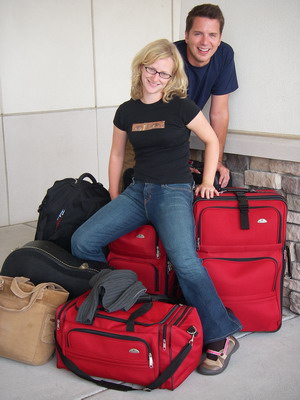
Coastal Carolinas is a quirky little book published by an unknown small company called Moon Publishers and written by one Mike Sigalis, a native Carolinian and Charleston fanatic with pronounced Bolshevik leanings, now living in exile somewhere in the Appalachians. As we plumbed through its pages, it became evident that Mike had no interest in hitting the appeal-to-the-masses tone of more commercial efforts like Fodor's; his book was totally idiosyncratic, sometimes hostile to its potential readership, and eccentric to the extreme in both its tone and its recommendations. One favorite passage, a digression on the relatively low elevation of the area, reads as follows:
With this lack of horizontal diversity comes a certain lack of drama. If Rebel Without a Cause had been set on the Carolina Coasts, Natalie Wood's boyfriend could never have flown off a cliff to his death. He'd have thudded into a huge barrier dune before he even got to the beach. And if he'd somehow reached the strand, he could never have drive neasily across the hard-packed sand, and once in the ocean, could have kept driving fifty yards towards Liverpool before the engine ever got wet at all. Then his car would have stalled out, and he could have swum safely back to shore through the pint-sized breakers.Initially, we whiled away the hours in the car by reading such passages out loud to each other in incredulous, mocking tones. But as the days passed, Mike started to seem more sympathetic, like a slightly deranged but good-hearted uncle or a wayward frat brother. By the middle of our second tour, it was as if Mike was in the car with us, directing our travels away from overcrowded hotspots ("South Carolina's beaches are a national treasure, and certainly [with the possible exception of central Myrtle Beach] a vast improvement over the overbuilt strips farther south in Florida") and towards sites like the truly bizarre Weeping Radish Brewery on the island of Manteo, offering pink-hued political and social commentary along the way. "Mike thinks..." became a mantra, and Mike's favorites became our own. Even the dilapidated hotel whose rooms were themed according to decade (our door sign had lost some of its letters, and bore the engagingly pathetic moniker "Room of the oaring wenties") seemed, under Mike's influence, an endearing example of worn Southern kitsch. Frequently hilarious and consistently weird, our guidebook shaped our trip in its own peculiar way.

This year, as we've begun to make our way around the world, we've had to rely on guidebooks in a more serious way, not just to find the best restaurants and hotels with clean sheets but to navigate the public transport, visa systems and cultural landscapes of totally foreign places. Over dinner at the Jerusalem favorite Spaghettim (where they top heaping plates of pasta with over 75 different sauces) yesterday, as we discussed our upcoming trip to Fiji, Laura commented that, while she is aware that people have travelled abroad without a guidebook, she's not sure how. The importance of the guidebook has been accentuated recently by our sad dependence on the thoroughly unreadable, out-of-date and generally unreliable Let's Go Travel Guide to Israel and the Palestinian Territories (after a similar experience with Let's Go Italy, Bill Bryson christened the series with the more appropriate title above; we have yet to come across a restaurant listed in this book that is still extant and/or occupying the listed location, although luckily some recommended drinking holes have survived). We were informed by a bookstore owner the other day that Let's Go is nevertheless the best guide to the area; a Rough Guide hasn't been published since 1998, and the Lonely Planet is even older. So Let's Go remains the only viable option, despite all its deficiencies and passages like "the Russian Compound's hip bar scene hugs the old world Mea She-arim like spandex on a yenta." Yikes. Where's Mike when you need him?






1 comment:
How about you write your own guide book? 'From the Midwest to the Mideast; searching for great food and relative comfort'
Post a Comment